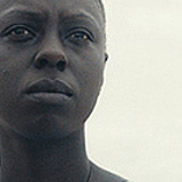Festival News

Kati Kati reviewed by Africa On My Sleeve
Kati Kati in a nutshell: haunting, enigmatic and profound. The word Katikati in Swahili means ‘centre’, or ‘in between’, which is fitting because the characters seem to be dancing in a state of limbo, located in a congenial and enticing purgatory. The film opens in the middle of nowhere, which is appropriate as it alludes to the despondency of the situation. Well, this no man’s land is technically not in the middle-of-nowhere, but in the open fields of Kenya; where our protagonist Kaleche (Nyokabi Gethaiga) stands stoically with an aura of bewilderment, her eyes searching as we observe her.
As Kaleche ventures further to explore her surroundings and find answers, it becomes glaringly obvious that nothing is at it seems. There is a similarity to the 1998 film Pleasantville as our protagonist finds herself in unfamiliar territory that exudes an eerily comfortable ambiance, and the society she has fallen into has accepted the peculiarity as the status quo. It is all very copacetic and calm on the surface but still waters run deep.
Kati Kati is multifaceted and deeply complex as it continues to unravel throughout the progression of the film. This can be seen through some central characters such as Thoma (Elsaphan Njora), the unofficial leader of the motley crew, and Mikey (Paul Ogola) the class clown. Kaleche does well in reflecting the mindsets of the audience such as acclimatization to the situation and the environment she is in. Nonetheless, just when you start to adjust, new developments in the characters arcs prove sobering and serve as a pin in the storyline.
There is a constant teasing of the audience with information, as questions pop up throughout the film like road signs, which finally lead to a shocking revelation in the film’s dénouement. The main themes of the film are freedom, identity, loss of innocence and death as a part of life. The cinematography of the film is imaginative and artsy, with beautiful still frames and captivating slow motion that gives the film a music video aura. The focus of the frames highlights the juxtaposition of the environment that Kati Kati is set in. On one hand, it’s hauntingly placid yet on the other it’s harsh and barren. A contemporary soundtrack that is a fusion of wavy European EDM and optimistic Afrobeats accompanies the cinematography. This marriage paints the walls of the utopia with a semblance of abstract freedom within an encapsulation.
My personal take home message from Mbithi Masya’s Kati Kati is that freedom results from introspection of yourself and looking deeper. Hopelessness or complacency can be a default emotion in the face of our demons that torment and follow us through life. Nevertheless, self-confidence arises from knowledge of yourself and a sense of identity. Seek your truth and your personal release as the characters of Kati Kati had to.
About the Author
A five-foot-eleven storyteller navigating my twenties as an aspiring actor, an aspiring writer and aspiring GIRLBOSS. I love cloudy days, books, films, pasta, dessert, my family and my friends. Iʼve spent many years unknowingly trying to seek for love, loyalty and respect from other people, without filling it up in myself. Thatʼs over. My minefield of an imagination is always powering and always fertile. Iʼm on a journey of spiritual, mental and physical self-discovery and itʼs never felt so right. In the words of Maya Angelou, “My mission in life is not merely to survive, but to thrive; and to do so with some passion, some compassion, some humour, and some style.” I will always speak my truth and live to best of my ability. May it brings pride to God, myself and my mama!
























